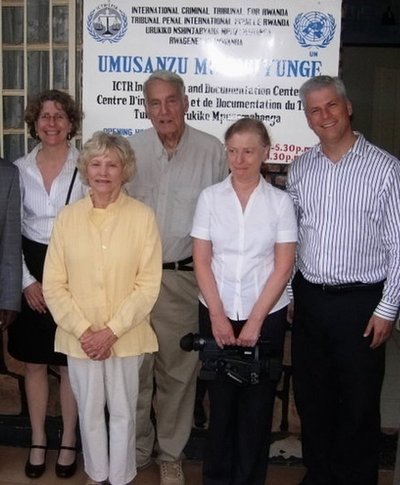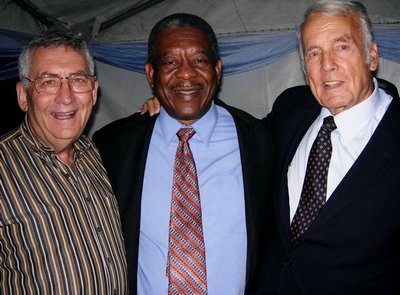January 22, 2009
Witnesses to genocide: Program presents interviews with Rwandan tribunal
Chief Prosecutor Hassan Jallow has confronted individuals responsible for masterminding hundreds of thousands of deaths in Rwanda.
He needed courage, however, to ask his driver in Kigali how he copes with the murder of his entire family. They were killed in 1994, during 100 days of genocide that left 800,000 Rwandans dead.
The people who committed the murders are in detention awaiting trial, the man told Jallow. The trial cannot bring back his family, he added, but it gives satisfaction and peace of mind, and thus he has no desire for revenge — at all.
Tuesday evening, Information School Professor Batya Friedman and a team of experts will present “Voices from the Rwanda Tribunal,” a unique collection of video interviews that contain the personal and professional reflections of 49 people — judges, investigators, bailiffs, interpreters, defense counsel and prosecutors such as Jallow — associated with the International Criminal Tribunal for Rwanda.
There have been other war crimes trials, but contemporaneous recollections and recommendations of court personnel have never been collected.
Last fall, Friedman led her 10-person team to Kigali and Arusha, Tanzania, where they recorded some 70 hours of video. “Many people at the tribunal have not had a chance to tell their stories,” Friedman said.
She and her team want the videos used around the world to prevent genocide, heal victims and improve international justice.
The United Nations Security Council created the tribunal in 1994, locating it in Tanzania in part because many Rwandans cannot go home without losing refugee status or courting harm.
The court prosecutes people accused of masterminding the murders, committing certain kinds of crimes such as rape or committing the crimes in geographically representative parts of Rwanda.
Various leaders of the Hutu people in Rwanda directed the slaughter, often by machete, against both the Tutsi people and moderate Hutus. The tribunal has had more than 70 individuals arrested, many of them Rwandan government officials, including former Prime Minister Jean Kambanda, who became the first head of government convicted for genocide. By the end of 2008, the tribunal had convicted 43 of 75 defendants, handing down sentences ranging from six years to life in prison.
What: “Voices from the Rwanda Tribunal” Note: The videos contain no confidential material but some may be unsuitable for children. |
The tribunal has been criticized for cost, slowness and relatively few convictions, but has established new jurisprudence, particularly regarding rape as genocide. Tens of thousands of women were raped during the 1994 genocide.
“According to people from the tribunal, sexual violence was used to dehumanize people, to spread disease in an intentional way,” Friedman said. “Women were mutilated…It is a way to destroy a people — physically, mentally, emotionally.”
Friedman’s team includes professional cinematographers, specialists in information systems and legal experts. The latter include former Washington State Supreme Court Chief Justice Robert Utter, former U.S. Attorney and Seattle University Law Professor John McKay, former King County Superior Court Judge Donald Horowitz, Seattle University Law Professor Ronald Slye and law students from SU and UW.
The 1994 genocide is over, but it continues making victims, Horowitz said. They include not only those who knew the Rwandans killed — a significant portion of the Rwandan population — but tribunal personnel and members of the project team, people who have worked with the stories. “I have been saddened to the center of my soul by what I have seen and heard,” Horowitz said.
Lisa Nathan, an Information School graduate student who helped conduct the interviews, feels similarly: “I feel a terrible sadness. In particular, I am haunted by the personal belongings left in the churches and schools — what people brought with them, running for safety: a hairbrush, a comic book, a cell phone.”
Genocide perpetuates losses not likely to be made up in a single lifespan, so the project team is making the Rwanda collection adaptable to social and technological changes far into the future. Tadayoshi Kohno, a UW computer science professor, joined the team to make the collection widely accessible yet secure against tampering. The project itself is part of Friedman’s research program on multi-lifespan information systems.
She and her team plan to gather more material in Rwanda this summer. Meanwhile, they sometimes show a short, four-interview video which includes Erik Mose, president of the Tribunal until 2007.
He chokes up while summarizing his work: “No one can be unaffected by 10 years in Arusha.”


